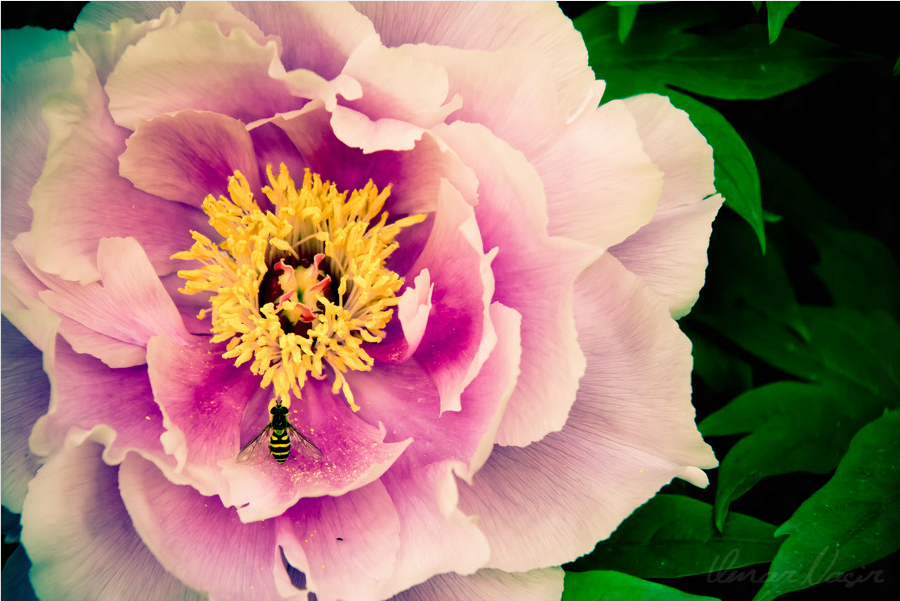By Khaled Dardir - June 18-22 2012 marks International Pollinator Week. Pollination plays a pivotal role in the life cycle of plants and the goal of the campaign is to raise awareness about the importance of these species. Pollinators range from bees and moths to birds and bats. The diverse range ensures that both flowers and crops are able reproduce and contribute to the overall health of the ecosystem. Khaled Dardir explores the role of one pollinator, the honeybee, and the health benefits associated with honey.
Among the many creatures Allah has created in this world, there is one in which Allah’s blessing is so clear that all of mankind sees it. This creature is no bigger than my thumb and affects our well being, our society and our economy. This miraculous creature is the honeybee. There is a reason why a whole chapter in the Quran has been devoted to it as Allah has enabled the honeybee to produce a substance within which there is a cure for all mankind. Allah says in the Quran:
And your Lord inspired to the bee, "Take for yourself among the mountains, houses, and among the trees and [in] that which they construct (Surat An-Naĥl: 16:68).
Then eat from all the fruits and follow the ways of your Lord laid down [for you]." There emerges from their bellies a drink, varying in colors, in which there is healing for people. Indeed in that is a sign for a people who give thought (Surat An-Naĥl: 16:69).
From these verses, we can see the reference to the healing benefits of the honeybee. Unlike other creatures that are limited in range to specific locations, the honeybee can be found worldwide, and its medicinal benefits are universal.
In a Hadith, Abdullah bin Mas’ood has reported Allah’s Messenger (PBUH) as saying:
“Make use of two remedies, Honey and Quran.”
Honey has been useful both as food and medicine. It has been produced by bees from nectar and contains a unique combination of sugars, acids, minerals, enzymes, vitamins, and flavour to make it one of the most nutritionally diverse and easily digestible foods known to man. For these properties it has become known as a Super-food for its superior health benefits.
Approximately a third of all the food we eat is due to pollination from the honeybee. Unfortunately, due to habitat loss, pollution, pesticides and disease their numbers have been dwindling. Over the last decade, there has been a startling rise in colony collapse disorder, a phenomenon by which the worker bees in a colony disappear. Research is still ongoing but several possible causes have been identified including pathogens, mites, radiation and fungus. As honeybees are essential for maintaining our food supply, it has become a major concern from an economic perspective as well. Without a healthy bee population, produce prices would skyrocket, costing both the agricultural and food industry billions of dollars.
The list of benefits which the honeybee gives to its consumers and our society through honey and pollination include:
- One teaspoon will help to clear most colds and coughs
- Drinking honey diluted in hot water in winter and cold water in summer relieves stress and is an ideal energy supplement
- A spoonful of honey early in the morning restores health and increases potency
- Honey improves memory and eyesight
- Honey strengthens the joints in the body
- Honey has four times more energy than milk
- Honey reduces stress and tiredness
- Honey is not harmful for diabetics
- Honey bees are vital as pollinators. They are responsible for 1/3 of your food.
- It is the only insect that produces food eaten by man.
- Honey is the only food that includes all the substances necessary to sustain life, including enzymes, vitamins, minerals, and water; and it's the only food that contains "pinocembrin", an antioxidant associated with improved brain functioning.
The critical role of the honeybee and the benefits of honey have only become apparent over the last several decades. Modern science is becoming more aware of the knowledge that has existed within the Quran and Sunnah over 1400 years ago, which is a testament to the signs of Allah. May Allah guide on the straight path, and guide to better understand his creations and his blessings.
Khaled Dardir has recently completed a Master of Science specializing in the chemistry and is currently enrolled as a student in Mishkah pursuing a bachelors in Islamic Studies. He is the founder and Chief Coordinator of the non-profit organization The Building Blocks of New Jersey whose mission is: “To aid self development, promote activism, and bolster community building”



